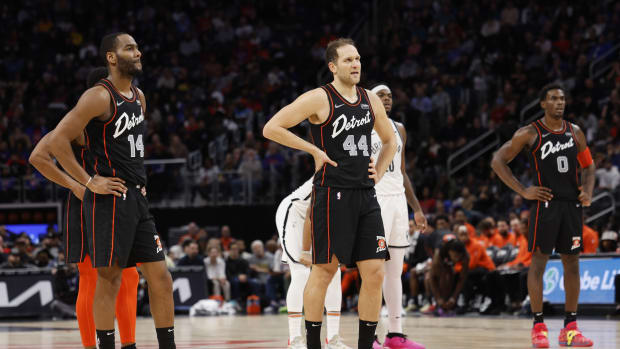The Key Legal Issues in Vanessa Bryant’s Lawsuit Against Helicopter Operator
As mourners attended a memorial service for her late husband and late daughter at the Staples Center on Monday, Vanessa Bryant commenced a wrongful death lawsuit against the company that operated the Sikorsky S-76 helicopter, which crashed and killed Kobe Bryant, 13-year-old Gianna Bryant and seven others in Calabasas, Calif., last month. According to a story published by the Los Angeles Times, Bryant’s complaint against Island Express Helicopters, Island Express Holding Corp. and the estate of the pilot, Ara Zobayan, was filed in Los Angeles County Superior Court.
The key legal issues in the lawsuit
The Los Angeles Times reports that Bryant’s complaint centers on alleged carelessness and recklessness by Zobayan, who was among the nine people killed. Zobayan, an experienced pilot who had flown Bryant many times, is accused of “failing to abort the flight, failing to monitor and assess the weather, and failure to keep a safe distance between natural obstacles and the helicopter.”
The employment relationship between Zobayan and Island Express is important for the litigation. Bryant contends that Island Express is vicariously liable for Zobayan’s alleged negligence. In the employment context, vicarious liability refers to a finding that an employer is negligent for the wrongful acts of an employee.
It remains undetermined why the Sikorsky S-76 crashed. Zobayan flew the helicopter in a very thick fog and in ways that eyewitnesses found erratic and treacherous. Before crashing into a hillside, the helicopter descended at a speed of more than 4,000 feet per minute. Earlier this month, the National Transportation Safety Board released a preliminary report. It indicated that the helicopter’s two engines were recovered at the crash site. The engines, according to the NTSB, did not exhibit signs of failure. Such a finding doesn’t eliminate the possibility of other aircraft issues, but it signals that a potential explanation has seemingly been ruled out. The NTSB will take over a year, and potentially two years, to reach conclusive findings.
To prove wrongful death, Bryant must show by a preponderance of the evidence that Zobayan (and, by extension, Island Express) owed duties of care to her husband and daughter and that Zobayan’s negligent actions and omissions caused their deaths.
There is no question that Zobayan, as a pilot, owed a duty of care to his passengers. He was obligated to fly them in a safe and reasonable way. There is also no question that the passengers died as a result of the crash. The more contentious issues are 1) whether Zobayan flew “unreasonably” as that term is understood under the law and 2) whether any such unreasonable flying caused the crash.
Bryant’s case would be enhanced if expert testimony and forensic evidence established that Zobayan flew the helicopter hazardously under the circumstances. It’s possible that Bryant will retain seasoned pilots to serve as expert witnesses. They could testify that, in their professional opinion, Zobayan undertook maneuvers that were inconsistent with his professional duties and that defied both Federal Aviation Administration rules and industry customs. Island Express, meanwhile, might retain experts who argue the opposite.
Island Express could also be exposed to a finding of unreasonable conduct if the company’s policies on hiring, training and monitoring employees were lax in ways that contributed to the crash. According to the Los Angeles Times, the FAA reprimanded Zobayan for an incident in 2015 in which he knowingly flew into an airspace where he would experience reduced visibility.
An incident from 2015 obviously doesn’t prove that Zobayan flew riskily in 2020. Likewise, one mistake (which Zobayan self-reported) doesn’t mean that the 50-year-old pilot had a track record of errors—in fact, the FAA report described the 2015 incident as not part of any worrisome trend. Still, the incident shows that aircraft companies that have employed Zobayan over the last five years were on notice that he flew recklessly on at least one occasion. The extent to which Island Express considered the 2015 incident in its employment relationship with Zobayan will likely be explored in the litigation. The more seriously Island Express took the matter the stronger a defense posture for the company.
Another problematic factor for Island Express is the helicopter’s certification, or lack thereof. According to The New York Times, while Zobayan was qualified to fly the helicopter, Island Express lacked the necessary federal certification for the helicopter to fly in the circumstances at issue in the Bryants’ crash. Zobayan was obligated to fly passengers only in conditions of sufficient visibility to navigate visually. Those conditions were not present on Jan. 26. The more often Zobayan flew passengers in unauthorized conditions, the worse off for Island Express in defending itself against Vanessa Bryant.
* Kobe Bryant's Memorial Provided a Peek Into Who He Really Was
Island Express could owe the victims’ families many millions of dollars
Island Express, which has suspended operations, could face massive financial damages should Bryant’s lawsuit prevail. The company is similarly exposed to lawsuits brought by the families of the other victims.
Potential recoveries in wrongful death cases take into consideration such factors as the victim’s life expectancy and earning potential. Gianna Bryant was only 13 and had her whole life ahead of her. While Kobe Bryant had retired from the NBA, he was still relatively young at 41. Bryant was also involved in a venture capital fund along with other business endeavors that may have generated significant wealth. Expert testimony would likely establish that Bryant had a capacity to generate sizable income going forward. Vanessa Bryant could also recover for the financial value of the loss of love, emotional support and affection, among other subjective but important qualities.
Reasons for Vanessa Bryant to sue for monetary damages
Some might wonder why Vanessa Bryant would pursue a case against Island Express given her immense wealth. According to Forbes, her late husband was worth around $600 million.
There are a least four reasons why Bryant still has reason to litigate.
First, the lawsuit is the only way that Bryant can attempt to hold Island Express accountable for the deaths of her husband and daughter. Bryant, like all private citizens, lacks the power to issue criminal charges. Similarly, she isn’t a government agency or a regulatory entity that can strip a license to operate an aircraft. She can attempt to gain justice only through the civil litigation system. Moreover, while a financial reward will not bring her loved ones back, it would signify where blame ought to lay.
Second, a sizable judgment against the company that Bryant believes is responsible for the deaths of her husband and daughter could put that company out of business. It’s unclear whether Island Express has the financial wherewithal, or the insurance coverage, to withstand a multimillion-dollar civil judgment. Along those lines, Bryant might secure a massive judgment but if Island Express (and Zobayan’s estate) can’t pay it, Bryant might never collect it.
Third, Bryant could donate any financial recovery to charity or causes. She is likely not suing to add to her wealth. She is suing to make a point.
Fourth, a finding that Island Express is responsible for the crash would help to extinguish any possibility, however remote, that the families of other victims might sue Bryant’s estate. This possibility was recently suggested by retired NBA player John Salley, a Lakers teammate of Bryant in the 1999–00 season. One theory is that Bryant owned the downed Sikorsky S-76B. However, records indicate that Island Express owned the helicopter. Another theory, which is not supported by any known evidence and probably can’t be supported given that the helicopter wasn’t carrying a black box, is that Bryant might have encouraged Zobayan to fly in dangerous conditions. Even if Bryant asked Zobayan to fly in a risky situation, Zobayan was the pilot and ultimately responsible for flight decisions.
It’s possible that Vanessa Bryant’s case against Island Express will end in a settlement. She has, essentially, unlimited financial resources to wage a litigation. Island Express, on the other hand, might be in a distressed financial state and unable to expend much money on a defense team. This asymmetry could lead Island Express to seek a settlement.
Sports Illustrated will monitor the situation and provide updates.
Michael McCann is SI’s Legal Analyst. He is also an attorney and the Director of the Sports and Entertainment Law Institute at the University of New Hampshire Franklin Pierce School of Law.


































